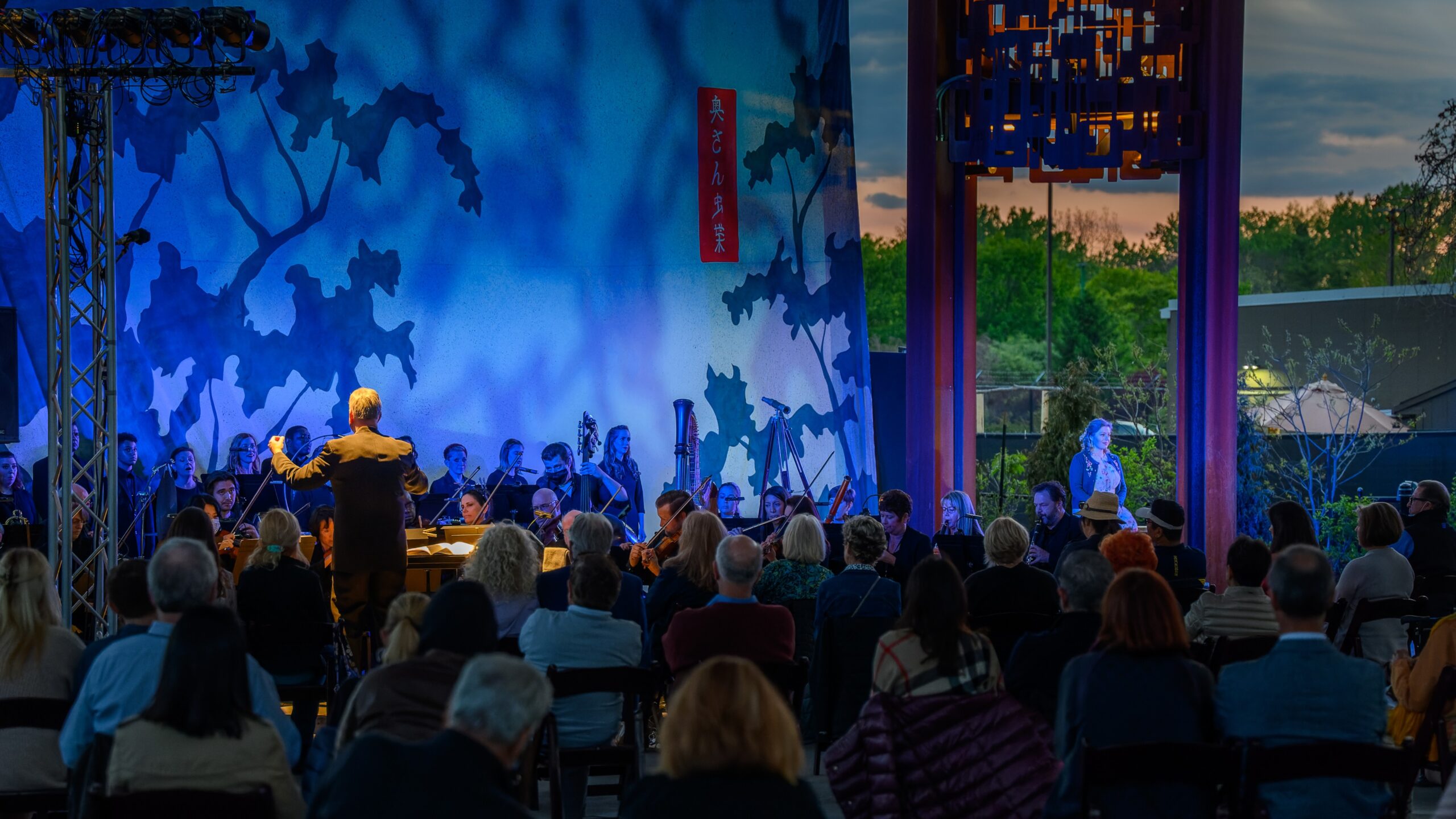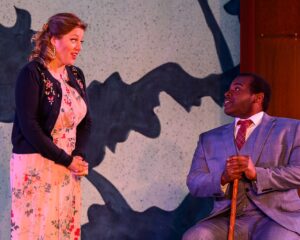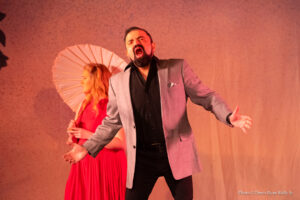
Madame Butterly – Courtesy of Indianapolis Opera. Used with permission.
It was a inspired stroke of innovation, not to mention showmanship, for Indianapolis Opera to present Giacomo Puccini’s beloved opera “Madame Butterfly” beneath the dramatic looking Bicentennial Pavilion at the Indianapolis Zoo. Presented in concert form, it was the first opera ever held at the zoo, located at White River State Park on Indy’s Westside. Held the weekend of May 14-16, I attended the opening night performance.

L-R Yulia Lysenko & Thomas Canon. Courtesy of Indianapolis Opera. Used with permission.
Performing in front of 300 people, all socially distanced and masked, the show was staged in a concert format, sans sets and costumes. With a large painted backdrop behind the, depicting trees with Japanese script the orchestra was stage right and the singers performed on a series of platforms stage left. Leading the orchestra was principal guest conductor Alfred Savia. Effectively directed by Scott Perry, the production’s beauteous lighting design was executed by Quentin James. Though credit was not listed in the program, the sound design for the concert, in which the singers wore mics, was excellent.
For those unfamiliar with the opera’s libretto, the opera, set in Japan, recounts the tragic story of a guileless and kind-hearted geisha Cio-Cio-San, who is manipulated by an American naval officer, Lieutenant Benjamin Franklin Pinkerton, and marries him. Trusting in his fidelity, she waits three years for his return and is overcome with joy, but then devastated when she learns he has married an American woman and they have come to take a son he has fathered with Cio-Cio-San. It’s a gut-wrenching betrayal for the unsuspecting victim, which leads to disastrous results.
Stunning in her role as the innocent and trusting Cio-Cio-San was Ukrainian soprano Yulia Lysenko, who moved me deeply with her performance, marked not only by her arresting vocals, but also her superb acting skills and vibrant state presence. Convincing as the unscrupulous cad Pinkerton was native Texan Hugo Vera, who also shined with his striking vocals and considerable acting prowess. Showing chemistry and passion, Lysenko and Vera brought chills down my spine as their characters express their love in “Vogliatemi bene.”

Hugo Vera- Courtesy of Indianapolis Opera. Used with permission.
Not to be overlooked were the performances of Melody Wilson as Suzuki, Thomas Cannon as Sharpless, Joseph McBrayer as Goro and Rafael Porto as Bonze. All in fine voice, they excelled in their supporting roles as did those in minor roles, and the chorus under the astute direction of John Schmid. Overall, the entire cast projected a robust energy and joy that surely was informed by performing in front of a full house after such a long period away from their art form.
Speaking of chills, the first-rate, 24-piece orchestra, expertly conducted by Savia, gave me my first taste of live orchestra music in 15 months, since before the pandemic. As I listened to their performance of Puccini’s opulent, yet plaintive score, at times, I became very emotional. Adding to the uniqueness of the experience was the occasional sounds coming from the animal exhibits. leaving me to wonder if Zoo inhabitants were enjoying Puccini’s masterpiece as much as their human counterparts.
As many others may be feeling these days, listening to live music once again in the company of other human beings felt very healing after months of isolation and reliance on technology for escape and entertainment. For me, because “Butterfly” is set in Japan and the plot depicts the abuse of an Asian by an uncaring, entitled American, I could not help but reflect on the current spate of attacks on members of the Asian community. As the best art does, the experience of “Madame Butterfly” elicited a range of emotions, both positive and negative. In the end, however, I left the zoo feeling hopeful and grateful that opera is alive and well and its reemergence is one more sign that life is slowly returning to normal.
For information about upcoming Indianapolis Opera performances and programs, visit Indyopera.org.





